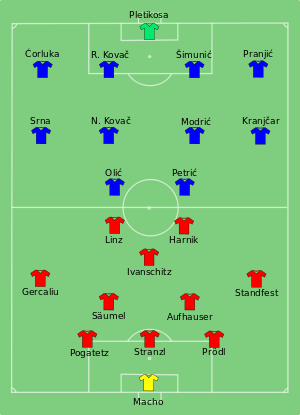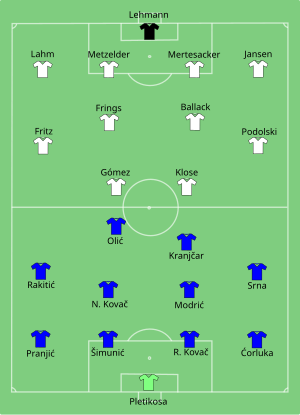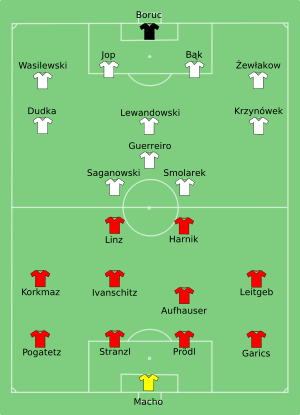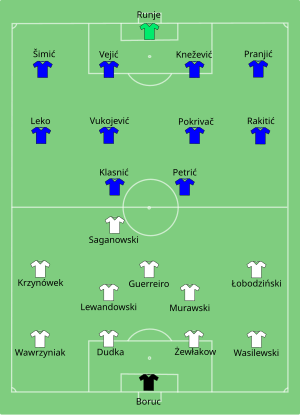
The 2008 UEFA European Football Championship, commonly referred to as UEFA Euro 2008 or simply Euro 2008, was the 13th UEFA European Championship, a quadrennial football tournament contested by the member nations of UEFA. It took place in Austria and Switzerland from 7 to 29 June 2008.

Ernst-Happel-Stadion, known as Praterstadion until 1992, sometimes also called Wiener-Stadion, is a football stadium in Leopoldstadt, the 2nd district of Austria's capital Vienna. With 50,865 seats, it is the largest stadium in Austria. It was built between 1929 and 1931 for the second Workers' Olympiad to the design of German architect Otto Ernst Schweizer. The stadium was renamed in honour of Austrian footballer Ernst Happel following his death in 1992. The stadium hosted seven games in UEFA Euro 2008, including the final which saw Spain triumph over Germany.
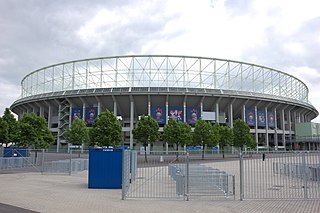
The UEFA Euro 2008 final was the final match of UEFA Euro 2008, the thirteenth edition of the European Championship, UEFA's competition for national football teams. The match was played at the Ernst-Happel-Stadion in Vienna, Austria, on 29 June 2008, and was contested between Germany and Spain.
The knockout stage of UEFA Euro 2008 began with the quarter-finals on 19 June 2008, and was completed on 29 June 2008 with the final at Ernst-Happel-Stadion in Vienna.
The knockout stage of the 1994–95 UEFA Champions League began on 1 March 1995 and ended with the final at the Ernst-Happel-Stadion in Vienna on 24 May 1995. The top two teams from each of the four groups in the group stage competed in the knockout stage. For the quarter-finals, each group winner was randomly drawn against the runner-up from another group, with the group winner hosting the second leg. The four quarter-final winners were then drawn together for the semi-finals, the winners of which contested the final.
Russia have participated in twelve UEFA European Championships, the second-most among all participants of the Euro after Germany, equalled to Spain, five of which were as the Soviet Union and one of which was representing the CIS. As the Soviet Union, their best performance was becoming champions in the inaugural 1960 edition in France, while their best performance as Russia came in the 2008 tournament held in Austria and Switzerland, when they reached the semi-finals.
The 2014 FIFA World Cup qualification UEFA Group C was a UEFA qualifying group for the 2014 FIFA World Cup. The group comprised Germany, Sweden, Republic of Ireland, Austria, Faroe Islands and Kazakhstan.
The UEFA European Championship is one of the major competitive international football tournaments, first played in 1960, whose finals stage has been held every four years.
The UEFA European Championship is the main football competition of the men's national football teams governed by UEFA. Held every four years since 1960, in the even-numbered year between FIFA World Cup tournaments, it was originally called the UEFA European Nations' Cup, changing to the current name in 1968.
The UEFA European Championship is the main football competition of the men's national teams governed by UEFA. Held every four years since 1960, in the even-numbered year between World Cup tournaments, it was originally called the UEFA European Nations' Cup, changing to the current name in 1968. Starting with the 1996 tournament, specific championships are often referred to in the form "UEFA Euro (year)”. Prior to entering the tournament, all teams other than the host nations compete in a qualifying process.
Italy have participated in eleven UEFA European Championships, and reached the final on four occasions. They became champions as hosts in 1968, the first European Championship they qualified for, and finished as runners-up in 2000 and 2012, before winning their second continental championship at Euro 2020.
Poland have participated in five UEFA European Championships so far, all consecutively: Euro 2008, Euro 2012, Euro 2016, Euro 2020 and Euro 2024.
Turkey have participated at six UEFA European Championships so far, with an upcoming seventh appearance in 2032 as co-host; the first group stage they qualified for was Euro 1996. Their best European performance to date was reaching the semi-finals in 2008, after winning their quarter-final match against Croatia on penalties.
Austria have appeared in four editions of the UEFA European Championship: 2008, 2016, 2020, and 2024.
The 2020–21 UEFA Nations League B was the second division of the 2020–21 edition of the UEFA Nations League, the second season of the international football competition involving the men's national teams of the 55 member associations of UEFA.
The UEFA Nations League is a biennial international football competition contested by the senior men's national teams of the member associations of UEFA, the sport's European governing body. The Croatia national team contests this tournament in League A, with other major footballing nations. The team entered the Nations League's inaugural 2018–19 edition in League A, along with England and Spain, in January 2018.
Group G of UEFA Euro 2020 qualifying was one of the ten groups to decide which teams would qualify for the UEFA Euro 2020 finals tournament. Group G consisted of six teams: Austria, Israel, Latvia, North Macedonia, Poland and Slovenia, where they played against each other home-and-away in a round-robin format.
The UEFA Nations League is a biennial international football competition contested by the senior men's national teams of the member associations of UEFA, the sport's European governing body. The first season began in September 2018, consisting of four groups in each of the four leagues ranked by UEFA coefficient of each country.
The 2022 FIFA World Cup qualification UEFA Group F was one of the ten UEFA groups in the World Cup qualification tournament to decide which teams would qualify for the 2022 FIFA World Cup finals tournament in Qatar. Group F consisted of six teams: Austria, Denmark, the Faroe Islands, Israel, Moldova and Scotland. The teams played against each other home-and-away in a round-robin format.
The 2022–23 UEFA Nations League A was the top division of the 2022–23 edition of the UEFA Nations League, the third season of the international football competition involving the men's national teams of the 55 member associations of UEFA. League A culminated with the Nations League Finals in June 2023 to determine the champions of the competition.
